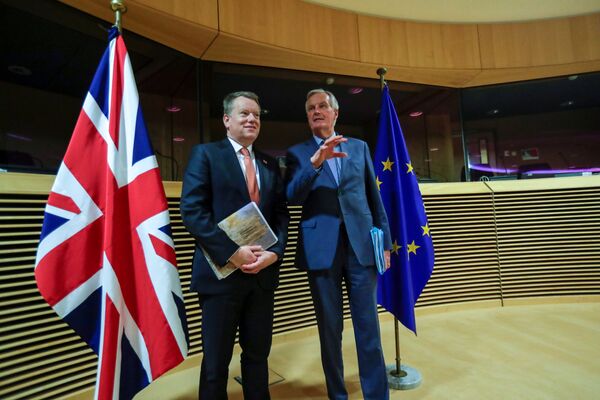The EU has been increasingly losing trust in UK Prime Minister Boris Johnson and his government’s strategy amid reopening Brexit negotiations, according to a spate of leaked diplomatic cables cited by The Guardian.
Sources reportedly claim the missives sent to EU diplomats from Brussels suggest Johnson is reluctant to negotiate a compromise on the key stumbling blocks in talks, such as fisheries, state aid and dispute resolution.
The cables intimate that “concerned” officials within chief Brexit negotiator Michel Barnier’s team believe the Prime Minister might be deliberately procrastinating to facilitate a last-minute “trade off” with the bloc to avoid a no-deal scenario.
“These points will not be easy to iron out with just a phone call between leaders. It is leaving it too late,” an commission official is believed to have told EU diplomats.
The report also cites EU fears that UK Home Secretary Priti Patel might be eying side negotiations on internal security issues, bypassing Brussels, during a meeting in London on 22 September with ministers from the five largest EU member states.
Sources reveal that European Commission officials have requested the diplomats of the countries concerned not to agree to any British proposals put forward.

The UK was also recently slammed over reports of allegedly “introducing” a new “concept” into negotiations between the sides pertaining to fisheries.
According to sources, “80 per cent of the common stocks” are designated as “priority stocks”, with UK fishermen granted the biggest claim to them.
The cited cables allegedly make reference to a spate of “anti-EU” articles in the British press that underscore the EU’s “intransigence” ahead of the final round of talks.
Backlash over ‘Plans to Rework Deal’
This comes as reports have suggested the UK was mulling proposals to revise the withdrawal deal penned last year to avoid a hard border on the island of Ireland.
London and Brussels had agreed in 2019 on the terms of the UK's exit, including on future trade in Northern Ireland. However, fears have been triggered that suggested plans to amend the UK Withdrawal Agreement - the Internal Market Bill - might undermine the legal force of parts of the protocol pertaining to Northern Ireland.
To contain the backlash over the reports, UK government sources sought to allay fears, stressing on Monday that only minor changes in the three key areas were being considered.
Nonetheless, a chorus of voices has opposed the reported draft legislation.
Former Conservative chancellor Philip Hammond and ex-justice secretary David Gauke have echoed claims the changes would undermine key parts of the Withdrawal Agreement.
“Any attempt to backslide from the commitments made in the Northern Ireland protocol would be seen as an act of bad faith by the EU and the wider world,” said Gauke.
Hammond tweeted that the government was on the brink of taking “incredibly dangerous step” with the potential to “hugely damage our standing on the world stage”.
2) The UK is a rule-of-law state, and attempting to legislate domestically to override international law would be an incredibly dangerous step and bound to lead to conflict with the judiciary. It would also hugely damage our standing on the world stage.
— Philip Hammond (@PhilipHammondUK) September 7, 2020
Responding to reports of potential changes to the agreement, an EU official was cited as saying:
“These are not changes made in good faith. But we will see what they actually do.”
Dismissing concerns, a UK official was cited by the outlet as saying:
“The government is completely committed, as it always has been, to implementing the NI protocol in good faith. If we don’t take these steps, we face the prospect of legal confusion at the end of the year and potentially extremely damaging defaults, including tariffs on goods moving from GB to Northern Ireland.”


